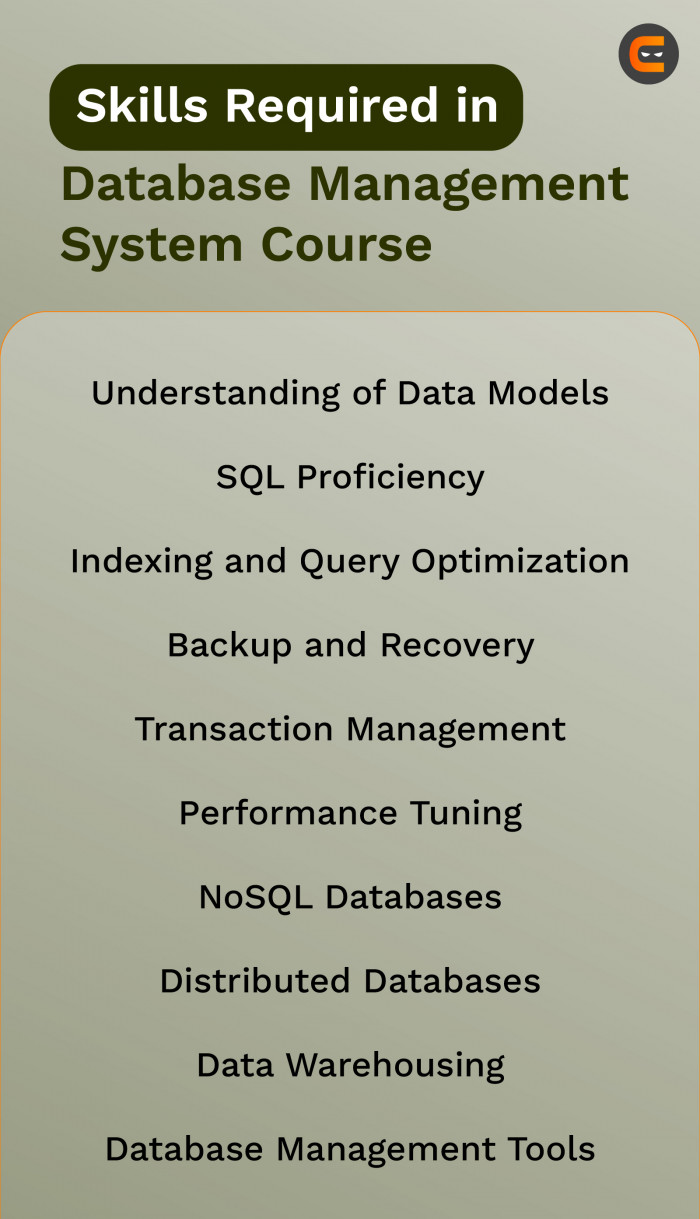 The eligibility criteria for joining a Database Management System (DBMS) course are crucial for ensuring that participants have the foundational knowledge and skills needed to grasp the complexities of managing and manipulating data in a systematic manner.
The eligibility criteria for joining a Database Management System (DBMS) course are crucial for ensuring that participants have the foundational knowledge and skills needed to grasp the complexities of managing and manipulating data in a systematic manner.
Let's explore the common eligibility requirements for joining a DBMS course. Furthermore, we will also delve into the concept of data mining functionalities. But before all that, we must understand DBMS and its features. So, let us get started.
What is DBMS?
A Database Management System (DBMS) connects databases by enabling data organization, storage, and retrieval. Its purpose is to maintain data integrity and to allow user engagement without the need for significant technological understanding.
DBMS controls operations such as data retrieval, modification, security, and storage in an effective manner. It facilitates the smooth processing of large datasets by supporting diverse data structures. DBMS is especially important in industries such as banking and healthcare and plays a critical role in improving decision-making processes.
Uses of DBMS
DBMS arranges large amounts of data, making storage and retrieval easier.
Allows for quick data access through efficient query processing.
Access management and user authentication are among the thorough security features used.
Restrictions on integrity provide data reliability, thus preventing discrepancies.
Allows numerous users to use the system at the same time, increasing operational efficiency.
Provides frequent backups to prevent data loss during system breakdowns.
Supports advanced queries for in-depth data analysis and decision-making.
Scalability to support expanding data or user needs vertically or horizontally, providing system adaptability.
Eligibility for Diploma or Certificate Courses
The duration of DBMS diploma and certificate programs normally ranges from 8 weeks to 2 years. Candidates must have finished their 10+2 education, preferably in the science stream, to be eligible. A minimum cumulative score of 50% is required for admission, with a slightly modified threshold of 45% for waitlisted students. The ability to use structured query language (SQL), solve problems, pay attention to detail, and comprehend organizational needs is required.
Eligibility for B.C.An in Database Management
Candidates for a Bachelor of Computer Applications (B.C.A.) degree in Database Management must have finished their 10+2 education, preferably in the science stream. A minimum cumulative grade of 50% is needed, similar to diploma programs, with a 45% relaxation for students from underrepresented groups. Along with academic qualifications, candidates should exhibit SQL proficiency, teamwork, leadership, and organizational ability.
Admission Process and Entrance Exams
Admission procedures for DBMS courses differ amongst universities, with some emphasizing merit and others relying on admission tests such as the IPU CET, LUCSAT, and PESSAT. These tests assess candidates' abilities in areas such as SQL, data modeling, and problem-solving.
Top Institutions and Colleges Offering DBMS Courses
Coding Ninjas, SRM University, Xavier's Institute of Computer Application, Vellore Institute of Technology, University of Mumbai, and Haryana College of Technology and Management are among the prestigious institutions and colleges offering DBMS courses to suit the growing demand for competent specialists in the area.
These educational institutes offer a full educational experience that combines academic knowledge with real-world applications.
Career Opportunities and Skills Required
Graduates of DBMS schools can find work in a variety of fields, including Data Scientist, Data Analyst, Database Administrator, Database Architect, and Database System Developer. Excellent analytical and organizational skills, attention to detail, understanding of business objectives, and SQL competence are required for success in these jobs.
Top 5 best DBMS courses
Top Database Management System (DBMS) course – Coding Ninjas
Coding Ninjas provides a DBMS course that includes 150+ exercises and 10 hours of specialized lectures for software engineering interviews. It offers 1:1 question help, mock interviews, and expert feedback, with an average CTC of 11 LPA, a 40x ROI, and a 95% placement success record.
SQL and Databases Bootcamp: Zero to Mastery [2022] – Udemy
SQL & Databases Bootcamp [2022] on Udemy includes SQL principles, querying, privilege management, backups, and database security.
Database Management Program (UC San Diego)
The Database Management Programme at UC San Diego covers SQL, data warehousing, transaction processing, and cloud computing, as well as electives such as web frameworks and MongoDB.
Data Manipulation with Python – Datacamp
Data Manipulation with Python by Datacamp focuses on Pandas for Python enthusiasts, including relational database basics and data manipulation techniques.
MicroBachelors® in Introduction to Databases (NYU on edX)
Introduction to Databases, a MicroBachelors® course at NYU, covers SQL queries, data models, relational structures, and concurrency management for programmers, OS enthusiasts, and networking enthusiasts.
Let us now talk about the next part of this blog, i.e, Data Mining functionalities.
What are Data Mining functionalities?
Data mining functionalities are the many operations and activities done in the process of collecting useful patterns, trends, and information from massive databases.
These functionalities enable the transformation of raw data into meaningful insights, facilitating decision-making and strategic planning. Among the most important data mining functionalities are:
Classification: Assigning established categories or labels to data based on its features, allowing for the prediction of future data point classifications.
Clustering: It is the process of grouping comparable data points together based on shared features in order to identify inherent patterns in the data.
Regression Analysis: The study of the connection between variables in order to predict numerical outcomes and forecast future trends.
Association Rule Mining: Discovering links and correlations between variables in data, revealing trends such as purchase behaviors or co-occurrences.
Outlier detection: It is the process of identifying unexpected or abnormal data points that depart from predicted trends, which aids in anomaly detection and data cleansing.
Sequential Pattern Discovery: Analyzing patterns and trends across time in order to find sequential links and dependencies within data.
These functionalities combined enable organizations to obtain relevant insights, improve decision-making processes, and achieve a competitive edge in a variety of industries.
Conclusion
In conclusion, pursuing a DBMS course equips individuals with essential skills for managing and extracting insights from vast datasets. Understanding data mining functionalities, such as classification, clustering, and association rule mining, becomes integral in transforming raw data into actionable knowledge.
For professionals navigating the evolving environment of information management and analysis, the symbiotic link between a DBMS course and understanding data mining functionalities is important.














